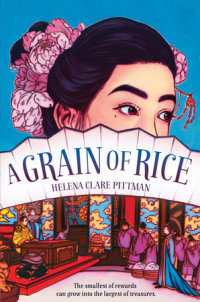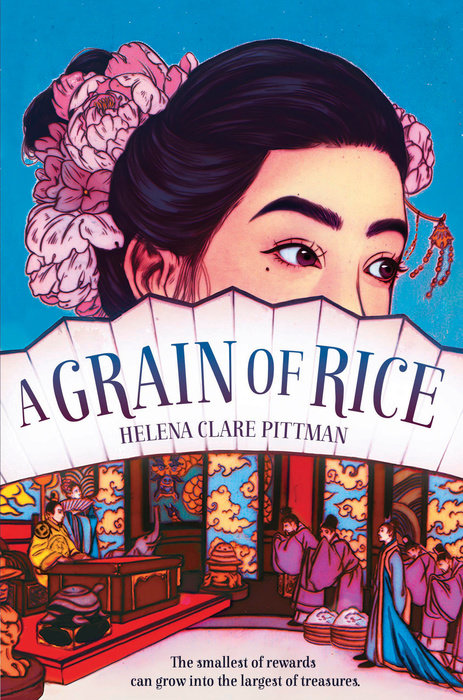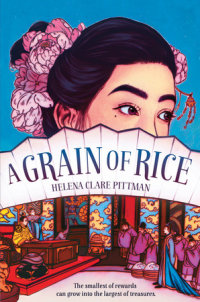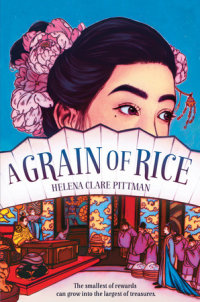Once a year the Emperor of China opened his court so that even the humblest of his people couldcome before him. It was on one such day that Pong Lo, the son of a farmer, knelt at the Emperor’s feet.
“Imperial Majesty,” said Pong Lo, “I have come to ask for your daughter’s hand in marriage.”
The Emperor’s lords were shocked.
The Princess Chang Wu, who stood near her father’s throne, lowered her eyes and blushed.
“How dare you make such a request?” demanded the Emperor. His eyes were fierce and his long mustache twitched. The peasant pressed his forehead to the silken carpet.
“Forgive me, Your Majesty . . . ,” he mumbled.
“Speak up!” commanded the Emperor.
Pong Lo lifted his head. “. . . but I am more than qualified to be her husband!” he declared.
The lords giggled.
“Qualified!” cried the outraged Em- peror, gripping his sword. “Such bold- ness qualifies you to lose your head!”
“But it is my head which qualifies me!” replied Pong Lo. “It is wise and quick and more than…
Once a year the Emperor of China opened his court so that even the humblest of his people couldcome before him. It was on one such day that Pong Lo, the son of a farmer, knelt at the Emperor’s feet.
“Imperial Majesty,” said Pong Lo, “I have come to ask for your daughter’s hand in marriage.”
The Emperor’s lords were shocked.
The Princess Chang Wu, who stood near her father’s throne, lowered her eyes and blushed.
“How dare you make such a request?” demanded the Emperor. His eyes were fierce and his long mustache twitched. The peasant pressed his forehead to the silken carpet.
“Forgive me, Your Majesty . . . ,” he mumbled.
“Speak up!” commanded the Emperor.
Pong Lo lifted his head. “. . . but I am more than qualified to be her husband!” he declared.
The lords giggled.
“Qualified!” cried the outraged Em- peror, gripping his sword. “Such bold- ness qualifies you to lose your head!”
“But it is my head which qualifies me!” replied Pong Lo. “It is wise and quick and more than a little clever, and would make me as fine a prince as China has ever seen.”
“Prince!” shrieked the Emperor. “A peasant cannot be a prince! A prince must come from noble blood!” His mustache twitched madly.
“My blood may not be noble, Your Majesty,” returned Pong Lo, “but it, too, is clever.”
“What do you mean?” the Emperor demanded.
“Though it has to find its way through seventy thousand miles of veins,” answered the peasant quietly, “it never fails to reach my heart.”
Now the lords smiled behind their fans at Pong Lo’s skillful answer. Princess Chang Wu’s black eyes sparkled.
“Enough of this!” growled the Em- peror, raising his sword.
“Father, wait!” The scent of lotus blossoms filled the air as the Princess rushed to the Emperor’s side. “Don’t be hasty, Father,” she begged. “The young man is clever. He could be useful!”
“He will be useful when his clever tongue is no longer flapping in his head!” the Emperor snapped.
“Father,” the Princess coaxed, “since he is so good with numbers, perhaps he can work in the storeroom.”
The Emperor eyed the peasant shrewdly. Pong Lo’s head was once again pressed to the floor. He looked so humble.
The Princess smiled hopefully at her father and placed her hand gently upon his. Her touch was like the brush of silk stirring in a summer breeze. Suddenly the Emperor’s cares felt lighter.
Sighing, the Emperor sat down again. “My gentle daughter,” he said, looking fondly at Chang Wu, “for your sake I will spare him. But he will have to prove his worth. He can scrub the storeroom. If he works hard he can stay.”
So Pong Lo was given a place to sleep in the farthest corner of the palace, and he was put to work. He cleaned the deep wooden storeroom shelves. He washed the grain bins and scrubbed the stone floor, and polished it carefully with a wax he made himself. It gleamed as it never had before.
“How do you do that?” asked the Imperial Storeroom Keeper.
“Just an old family recipe,” Pong Lo answered cheerfully. And when he had finished that, instead of going off to drink tea or sit under a tree, he helped the other storeroom servants, sorting the grains that came from the Emperor’s fields. The expression on his face was always pleasant, and his step was light. As he worked he often hummed a merry tune which was so delightful that the other servants couldn’t help but sing with him.
Pong Lo did everything so well that the Imperial Storeroom Keeper put him in charge of the shelves. He stored the beans and dried fruits. He shelled the nuts and stacked the pickled eggs and vegetables. He laid the teas and spices carefully in their boxes, and kept count of everything. When something was in short supply he always noticed. He knew where to get even the strangest ingredients and at the best price. He knew so much about rare herbs and spices that before long the Emperor’s cooks were seeking his advice.
The Imperial Storeroom Keeper told the Steward. The Steward told the Min- ister of Palace Affairs. The Minister told the Chamberlain. The Chamberlain told the Prime Minister, and the Prime Minister told the Emperor.
“Hmmm,” said the Emperor, strok- ing his mustache. “Clever indeed! Make him Imperial Assistant to the Imperial Storeroom Keeper.
“Clever is the word!” the servants whispered.
But as if that weren’t enough, when his long day in the storeroom ended, Pong Lo asked to help in the kitchen.
At first he sliced and diced and chopped, whistling as he worked. He stirred and sampled, and offered a pleasant suggestion or two. Soon he was salting and seasoning until the fragrance of his sauces steamed through the pal- ace. The Imperial Cooks whistled along with Pong Lo’s lively tunes. The Imperial Kitchen Maid trilled a chorus. The waiters stepped jauntily as they carried their trays from the kitchen to the Emperor’s table, and everyone from lords to servants looked forward as never before to the next meal—even the Imperial Kitchen Cat, who purred loudly over the leftovers. Pong Lo’s recipes were delicious!
The Emperor, who loved to eat, was delighted. “Excellent!” he remarked to the Princess night after night over dinner. “Make him Imperial Assistant to the Imperial Cook as well!” he told the Prime Minister. Pong Lo was moved to a small room, in keeping with his new position.



